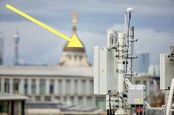This article is more than 1 year old
It's been one day since Blighty OK'd Huawei for parts of 5G – and US politicians haven't overreacted at all. Wait, what? Surveillance state commies?
You've fscked us, says Uncle Sam
Yesterday it was decided that certain "high-risk" vendors, cough, cough, Huawei, will be permitted to contribute components towards the UK's 5G network in a limited way.
The move provided great relief to Huawei, and caused some dismay in the US.
Perhaps the strongest words came from junior Republican senator for Nebraska Ben Sasse. In a statement to the conservative Washington Examiner, he said Blighty's Department for Digital, Culture, Media and Sport's decision had made the UK's special relationship with the US "less special" and accused the British government of embracing the "surveillance state commies" at Huawei.

UK to Chinese telecoms giant: From 5G in Tiree to the Isles of Ebony, carry me on the waves… Sail Huawei, sail Huawei, sail Huawei
READ MORERepublican Texas senator Ted Cruz, who was runner-up in the 2016 Republican presidential primaries, was similarly damning. He accused Brit politicians of endangering the "national security of Britain, as well as [the] US and allies, for generations to come".
In a tweet, senator and fellow 2016 presidential candidate Marco Rubio (R-FL), was milder. He accused the UK of being "penny wise, pound foolish".
Arguably the most revealing condemnation came from former House speaker and Republican party grandee Newt Gingrich. He described yesterday's decision as a "major defeat for the United Statees [sic]" and issued calls for government intervention to create an alternative to Huawei's 5G hardware that would compete with the Chinese government on cost.
"Congress should pass a bill calling for an all out United States effort to develop better technology at lower cost to defeat Huawei on 5G worldwide by simply outcompeting them and driving them out of markets," he added.
One of the major factors that have attracted UK telcos to Huawei is the fact that it dramatically undercuts competing products from rivals such as Nokia, Ericsson and Samsung.
"If the United States offers better logistics supply chain, better technology and lower costs virtually the entire world outside China would shift away from Huawei," tweeted Gingrich.
At the time of writing, Congress is yet to pass a law earmarking funding for new 5G infrastructure R&D. Even if it did, any new products would take years to come to fruition and would require vast sums of money.
For context, Huawei spent $15.3bn on R&D in 2018 alone, surpassing the likes of Microsoft, Apple and Intel, according to data from Bloomberg. The only companies that spent more were Amazon, Alphabet and Samsung.
The chorus of condemnation from Republican lawmakers is loud indeed, and it's yet unclear whether this will translate into any more concrete actions against the UK, either through diplomatic means, or via the exertion of economic pressure. To get a sense of the vibe on Capitol Hill, The Register spoke to Kathryn Waldron, resident fellow of national security and cybersecurity at R-Street, a non-partisan think tank based in Washington DC.
"UK policymakers should acknowledge this decision will have significant global repercussions. The US has strongly pressured the UK to unite together against Huawei, and thereby against China. The UK's decision to allow Huawei to remain in their supply chain represents a fracture in the West's approach to the larger issue of China, a fracture China will no doubt encourage through using economic pressure on European countries," she said.
Waldron noted the Huawei issue is an ongoing concern for the current US administration, which has consistently lobbied Downing Street to take drastic action against the Chinese firm, culminating in a direct call between Boris Johnson and Donald Trump last Friday. The recent move will therefore be seen as nothing short of a snub.
"This public rejection of the American approach to handling Huawei will likely exacerbate tensions in US-UK relations. In response to the UK's decision, American senator Lindsay Graham (R-SC) tweeted that the UK's stance on Huawei could complicate not just a US-UK free trade deal but also intelligence-sharing programs," Waldron explained.
The timing of this move leaves the UK in somewhat of a precarious position. On Friday, it will leave the European Union after years of negotiation and hand-wringing. Although it'll enter a transition period, where it'll effectively remain in the customs union and single market, Britain will be pushed to roll over existing trade deals, as well as forge new ones.
An Anglo-American trade deal is a major priority of the current Conservative-majority government. However, Waldron notes that the move to permit Huawei's 5G gear – even in the most limited of capacities – could complicate negotiations.
"I wouldn't rule out some sort of punitive action in the form of delaying trade negotiations," Waldron said. "The current administration has repeatedly embraced using economic tools such as tariffs or trade deals as political signals to indicate their displeasure." ®

